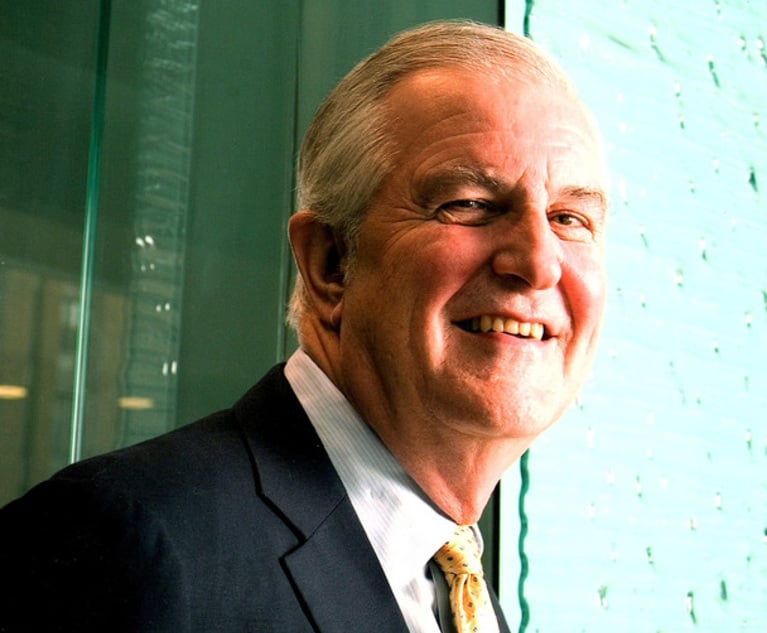Paul Weiss Posts Gains in Revenue, Profits as Lawyer Head Count Hits 1K
“We are clicking on all cylinders. So one of my major initiatives is not to screw up any of this,” said chairman Brad Karp.
February 16, 2018 at 02:34 PM
4 minute read

Paul, Weiss, Rifkind, Wharton & Garrison has posted its ninth straight year of revenue growth, pulling in more than $1.3 billion in 2017, according to preliminary ALM reporting. That's up 6.5 percent from the prior year.
“We are clicking on all cylinders. So one of my major initiatives is not to screw up any of this,” said Brad Karp, who has served as Paul Weiss' chairman since 2008.
Profits per equity partner rose 4.2 percent to more than $4.56 million and the equity partnership grew by 4.6 percent, adding five partners for 144 in all. Revenue per lawyer rose 2.2 percent to more than $1.3 million for the firm, which added 41 lawyers to reach an overall lawyer head count of 1,000 lawyers.
“Explosive growth in our transactional work” has continued to broaden the firm's reputation, Karp said. Once best known for its white-collar criminal defense and litigation practices, the firm has solidified its M&A credentials, he said. In 2017, Paul Weiss advised Qualcomm, previously a longtime client of Cravath, Swaine & Moore, on a $103 billion offer from rival Broadcom Corp.
 Paul Weiss also secured a lead role for Kraft Heinz on its proposed but then halted $143 billion sale to Uniliver. And the firm represented Xerox Corp. in its proposed merger with Fujifilm Holdings Corp., a deal that would create a company with $18 billion in annual revenue.
Paul Weiss also secured a lead role for Kraft Heinz on its proposed but then halted $143 billion sale to Uniliver. And the firm represented Xerox Corp. in its proposed merger with Fujifilm Holdings Corp., a deal that would create a company with $18 billion in annual revenue.
Over the course of one day this January, the firm closed transactions for five publicly traded clients, a record, Karp said.
In the private equity market, the firm moved up from 12th to 8th place in the most recent Vault.com legal adviser rankings. In 2017, it represented Apollo Global Management when it raised nearly $25 billion.
With its bankruptcy and corporate reorganization practice, the firm, once known for representing mostly creditors, took on high-profile debtors as well, taking the lead advising Cumulus Media Inc. on its Chapter 11 case.
Paul Weiss' litigation practice has not slowed in the meantime, Karp said. In 2017, Karp led a team representing Banamex USA, a Mexican unit of Citigroup, which agreed to pay more than $97.4 million and enter into a nonprosecution agreement to settle allegations the company violated the Bank Secrecy Act.
Karp also cited the firm's defense of the National Football League in litigation against plaintiffs who have sought damages tied to players' concussion-related injuries. The dispute led to the creation of a $1 billion settlement fund, but legal battles persist.
The firm continued in 2017 to represent Exxon Mobil Corp. The oil giant is battling state attorneys general seeking to uncover what and when its management gained knowledge about the consequences of fossil fuels on climate change.
Karp has mainly kept his foot off the lateral hiring accelerator, he said, but the firm still made several significant hires. Those include Paul Basta, who was at Kirkland & Ellis and now co-chairs Paul Weiss' bankruptcy and corporate reorganization practice; Jeh Johnson, the former U.S. Secretary of Homeland Security in the Obama administration, who was returning to the firm; and Alvaro Gomez de Membrillera Galiana, a corporate partner who switched from the London office of Simpson Thacher & Bartlett to join Paul Weiss there.
In 2018, Karp expects another robust revenue year, with plenty of business but no rush to hire laterals, no opening of far-flung offices, no seeking out exotic new practices, and no planned or intentional disturbances of the firm's equilibrium. Or as he put it, not screwing up.
The American Lawyer will release its full report on the Am Law 100 in its May magazine.
This content has been archived. It is available through our partners, LexisNexis® and Bloomberg Law.
To view this content, please continue to their sites.
Not a Lexis Subscriber?
Subscribe Now
Not a Bloomberg Law Subscriber?
Subscribe Now
NOT FOR REPRINT
© 2025 ALM Global, LLC, All Rights Reserved. Request academic re-use from www.copyright.com. All other uses, submit a request to [email protected]. For more information visit Asset & Logo Licensing.
You Might Like
View All
Demand Growth to 'Likely Weaken' in 2025 After 'Anomalies' Propelled Big Law Profits in 2024
5 minute read

Capital Markets Partner Rejoins O’Melveny Ahead of Expected Uptick in Demand

KPMG Law Seeks Alternative Business License, Shaking Up Legal Status Quo
3 minute readTrending Stories
Who Got The Work
Michael G. Bongiorno, Andrew Scott Dulberg and Elizabeth E. Driscoll from Wilmer Cutler Pickering Hale and Dorr have stepped in to represent Symbotic Inc., an A.I.-enabled technology platform that focuses on increasing supply chain efficiency, and other defendants in a pending shareholder derivative lawsuit. The case, filed Oct. 2 in Massachusetts District Court by the Brown Law Firm on behalf of Stephen Austen, accuses certain officers and directors of misleading investors in regard to Symbotic's potential for margin growth by failing to disclose that the company was not equipped to timely deploy its systems or manage expenses through project delays. The case, assigned to U.S. District Judge Nathaniel M. Gorton, is 1:24-cv-12522, Austen v. Cohen et al.
Who Got The Work
Edmund Polubinski and Marie Killmond of Davis Polk & Wardwell have entered appearances for data platform software development company MongoDB and other defendants in a pending shareholder derivative lawsuit. The action, filed Oct. 7 in New York Southern District Court by the Brown Law Firm, accuses the company's directors and/or officers of falsely expressing confidence in the company’s restructuring of its sales incentive plan and downplaying the severity of decreases in its upfront commitments. The case is 1:24-cv-07594, Roy v. Ittycheria et al.
Who Got The Work
Amy O. Bruchs and Kurt F. Ellison of Michael Best & Friedrich have entered appearances for Epic Systems Corp. in a pending employment discrimination lawsuit. The suit was filed Sept. 7 in Wisconsin Western District Court by Levine Eisberner LLC and Siri & Glimstad on behalf of a project manager who claims that he was wrongfully terminated after applying for a religious exemption to the defendant's COVID-19 vaccine mandate. The case, assigned to U.S. Magistrate Judge Anita Marie Boor, is 3:24-cv-00630, Secker, Nathan v. Epic Systems Corporation.
Who Got The Work
David X. Sullivan, Thomas J. Finn and Gregory A. Hall from McCarter & English have entered appearances for Sunrun Installation Services in a pending civil rights lawsuit. The complaint was filed Sept. 4 in Connecticut District Court by attorney Robert M. Berke on behalf of former employee George Edward Steins, who was arrested and charged with employing an unregistered home improvement salesperson. The complaint alleges that had Sunrun informed the Connecticut Department of Consumer Protection that the plaintiff's employment had ended in 2017 and that he no longer held Sunrun's home improvement contractor license, he would not have been hit with charges, which were dismissed in May 2024. The case, assigned to U.S. District Judge Jeffrey A. Meyer, is 3:24-cv-01423, Steins v. Sunrun, Inc. et al.
Who Got The Work
Greenberg Traurig shareholder Joshua L. Raskin has entered an appearance for boohoo.com UK Ltd. in a pending patent infringement lawsuit. The suit, filed Sept. 3 in Texas Eastern District Court by Rozier Hardt McDonough on behalf of Alto Dynamics, asserts five patents related to an online shopping platform. The case, assigned to U.S. District Judge Rodney Gilstrap, is 2:24-cv-00719, Alto Dynamics, LLC v. boohoo.com UK Limited.
Featured Firms
Law Offices of Gary Martin Hays & Associates, P.C.
(470) 294-1674
Law Offices of Mark E. Salomone
(857) 444-6468
Smith & Hassler
(713) 739-1250








